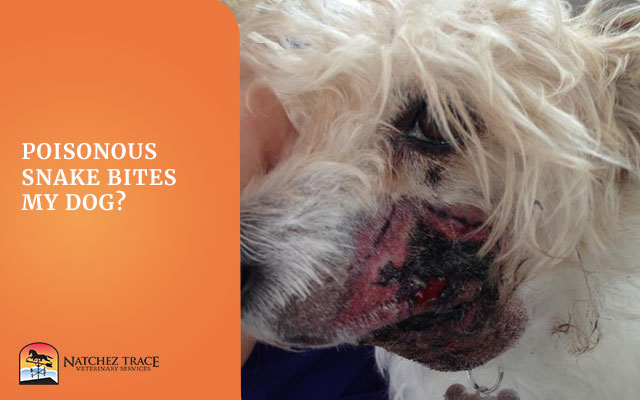What do I do if I see a poisonous snake bite on my dog? What are the snake bite symptoms?
Today, I saw a unique case of a snakebite in a Terrier named Jess. We see these fairly common and I thought it would be an interesting article. In Tennessee, there are four snakes considered to cause potential problems in pets. They are collectively termed “pit vipers” and consist of the following: Northern and Southern Copperhead (Agkistrodon contortix), Timber Rattlesnake (Crotalus horridus), Western Cottonmouth (Agkistrodon piscivorus) and the Western Pigmy Rattlesnake (Sisturus miliarius). For more info on poisonous snakes in Tennessee
click here.
The Bite and Venom: Snake Bite Symptoms
The venom is not considered more toxic during the summer months; however, snakes show increased aggression and venom yield with environmental warming and longer photoperiod (as in the spring and summer). The maximum venom yields occur during the hottest months of summer. Therefore, this is the time when most of our pets are most susceptible to snake bites. It is possible that a life-threatening envenomation may occur with no local clinical signs other than the puncture wounds themselves. Local tissue signs of pit viper envenomation include puncture wounds, one to six from a single bite, which may be bleeding. Rapid onset of pain may ensue with progressive edema, ecchymosis, and petechiation. In some snake bite symptoms, tissue necrosis may occur, particularly in envenomations to areas without a significant subcutaneous tissue mass. The presence of fang marks does not indicate that envenomation has occurred, only that a bite has taken place. It must be reiterated that the severity of local signs does not necessarily reflect the severity of the systemic envenomation.
First Aid
What do you do if you think a snake has just bitten your dog? Well, people ask all the time, do we need to know what kind of snake? Unless your dog killed the snake, you will never know and you will never be able to find out! So, the answer is no!! As a veterinarian, you treat what you find! However, first aid is definitely important. Keep your pet calm as best you can. However, more importantly, YOU remain CALM. Drama often makes the situation much worse. Just get your pet to your veterinarian as quickly as possible. No other first aid is really going to alter the outcome at this point.
At Vet after Poisonous Snake Bites My Dog
You have two options at this point that should be considered depending on your budget and how much YOU want to do to lessen the severity of the snakebite.
Conservative Therapy: Basically, fluids, antibiotics and pain medicine!
Aggressive Therapy: Anti-Venom plus Conservative Therapy!
Two companies, Fort Dodge and Wyeth Ayerst Laboratories produce antivenin. Veterinary clinics and human hospitals in areas that have a high population of pit vipers have this product on hand. Many owners want to carry this product with them, but because of the intravenous administration and instability of the product, it is recommended that a veterinarian give the anti-venom.








